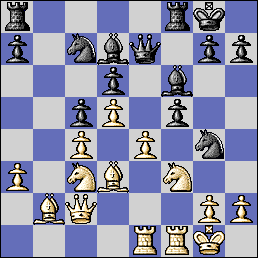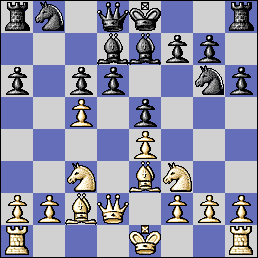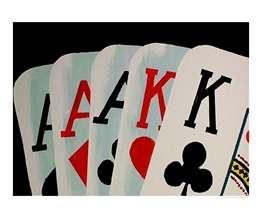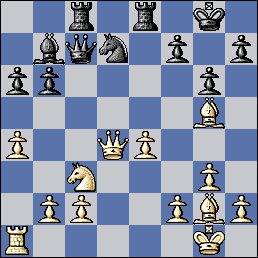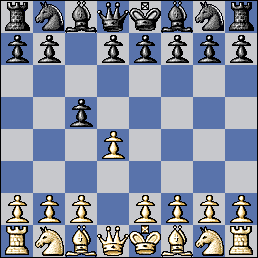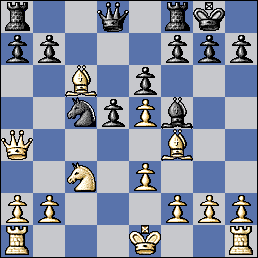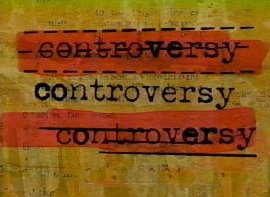I'm not one of those people who has nothing but disdain for the Alapin Sicilian. In fact, it's just the opposite. I've been playing 2.c3 for most of my tournament career. It's the only move I play against the Sicilian (unless I'm absolutely sure you play 2...Nc6, in which case I might play 2.Nf3 Nc6 3.c3!). One of my most memorable wins occurred on the White side of the c3 Sicilian. I keep the Rozentalis & Harley book on my night table and I have a poster of Sveshnikov over my bed. Well the part about the poster isn't actually true, but if I didn't think my wife would divorce me I might just try to put it up.
Despite all this...
Larry! What were you thinking playing 2.c3 against Pascal? The line is the antithesis of the "Storming The Barricades" approach to chess. Strong GMs play it as White when they want to draw, but the Blitz' strategy for the match really depended on a win on Board 1.
I know what people will say, "Christiansen lost his last two encounters to Charbonneau in the Open Sicilian. He needed to try something else." First off, everyone seems to forget that Larry had an easy draw in last year's encounter and lost only when he tried to win an unwinnable position because the overall match score required it. Second, I can't believe that Pascal has actually refuted 3.d4 in the Sicilian (one would think that New In Chess would have had an article about it). Surely there must have been improvements for White in the earlier games. Among the GM class, if you need to generate winning chances against 2...c5, isn't an Open Sicilian the best chance? Lastly, even if I grant that Charbonneau has managed to get into Christiansen's head in such a way that Larry believed he needed to try something else, I just can't believe that 2.c3 was the best choice for trying to achieve the kind of attacking positions he thrives on.
I know what people will say, "It didn't matter anyway. Another half point from Board 1 wouldn't have changed the outcome." I certainly grant that Foygel's loss to Krush inflicted great damage on the cause. Had you told me in advance that New York would score a full point on Board 2, I would have had to agree that New York would be favored to win the match. Nevertheless, as things turned out a win on Board 1 could have made all the difference in the world because Riordan came out of the opening with a strategically superior position against Hess. Whether Charles would have actually scored the point will never be known (it's not as if he played perfectly after 15.c5), but he might have and with draw odds that could have been enough to propel Boston to the finals.
At this point, journalism professors everywhere are adding this post to their folder of examples of 'burying the lead'. So for those of you who didn't watch the match or don't actively follow the league, let's start over...
 It turned out to be a Boston-New York matchup where the team from the Hub played the role of the 2006 Yankees. After dominating the Eastern Division during the US Chess League regular season, the Blitz fell 3-1 to the Knights in the second round of the playoffs. Instead of playing the San Francisco Mechanics in two weeks for the USCL Championship, the guys will be at home watching New York, a team that finished the regular season with a losing record, take a shot at the crown.
It turned out to be a Boston-New York matchup where the team from the Hub played the role of the 2006 Yankees. After dominating the Eastern Division during the US Chess League regular season, the Blitz fell 3-1 to the Knights in the second round of the playoffs. Instead of playing the San Francisco Mechanics in two weeks for the USCL Championship, the guys will be at home watching New York, a team that finished the regular season with a losing record, take a shot at the crown.
How could this have happened? Let's take a look at some key positions.
On Board 1, the first critical moment occurred after move 1 when GM Christiansen responded to GM Charbonneau's Sicilian with 2.c3. Oh wait, I think we've already covered this... The fact is that Larry did get some attacking chances when Pascal chose reasonable, if not the best, continuations. For example, instead of 7...Nc6 Black might have tried the plan Bc8-d7-c6 with Nd7 and 8...dxe5 9.dxe5 g6 is a good alternative to 8...Be7. Larry had options as well like 10.Re1 in place of Qc2 and/or somehow finding time for h2-h4-h5 to loosen up Black's Kingside. In the end however, while it's hard to find fault with Christiansen's play the position just never offered him enough to generate real winning chances. This, I believe, can be traced back to the choice of opening.
With no win on Board 1, the result on Board 2 became crucial for the outcome of the match. To her credit, IM Krush played well to avenge her previous defeat at the hands of IM Foygel. The key position in this game occurred after 20.e4. Igor's 20...f4 allowed White to begin exposing Black's King by taking the h7 pawn (after 21.e5 Nxe5 22.Bxh7+) but more importantly, made it difficult for Black to defend the white squares on the Kingside. Ultimately these factors led to Foygel's demise. For the record, our silicon friend Fritz prefers 20...Rae8.
I can't move on to the next board before responding to Jennifer Shahade's comments at USChess.org. Since I'm about to complain about being taken out of context, let me quote her comments in full so I won't be accused of the same:
The one bright spot of the evening for the Blitz was Board 3. NM Riordan clearly got the best of FM Hess in the opening and with 15.c5 secured a position which was probably winning from a strategic point of view. Nevertheless, Robert did well to generate some counterplay through piece play and may very well have equalized the position when a draw was agreed. However, had the match still hung in the balance I'm sure Charles would have continued and Black's split pawns on the Queenside surely would have given him something to work on. Besides, (and I know this will be confusing to those of you who haven't followed Riordan this year) he was in time trouble and that's almost always the precursor to good things for Boston.
Board 4 went quite badly for the Blitz when Herman showed that New York didn't need a 2300 player in order to secure the point. During the game I thought Krasik just played badly. And while he did make some really poor moves near the end, he was already in trouble at that point. In point of fact, his counterattacking ideas with 16...d5 and 17...Bc5 almost worked. In looking for an improvement, I had to go all the way back to 15.f5 where Fritz suggests that passive defense with 15...Bc6 16.g4 h6 17.h4 Nh7 is the way to go. It was certainly a tough night for Ilya, but no one should make the mistake of thinking that this match was lost on the lower boards.
Off the boards, Team Manager Matt Phelps has expressed the concern that fans might hold him accountable for the loss because of his lineup choice. In my view this would be misguided. Both the two GM lineup and the one Matt chose were perfectly reasonable. Even if Perelshteyn were on Board 2 and did beat Krush, who's to say that Hess wouldn't have taken care of Martirosov? No, the manager did his job just fine; unfortunately, for one of the rare times this season his players let him down. Too bad it happened during the playoffs.
So that's it. Congratulations to the Blitz for a great regular season that kept chess fans around here highly entertained for the past several months. And congratulations to the New York Knights who played a strong match to earn their shot at the Championship. Who will I be rooting for in the finals -- the divisional rivals who vanquished Boston's dreams or the Friedel-led car fixers? I'll take the traditional, parochial Bostonian point of view -- What Championship match? Isn't the 2006 season over?
 *****
*****
On a personal note, I hope you have enjoyed the 2006 coverage of the Boston Blitz and the US Chess League here at BCC Weblog. Even if you're one of the people who thought the coverage often conflicted with your opinion or pissed you off let me still say, "Thanks for reading and leaving comments." I hope you'll keep coming by this little corner of the blogosphere as we shift back to our regular programing schedule and we'll see y'all next year for the 2007 US Chess League season.
Despite all this...
Larry! What were you thinking playing 2.c3 against Pascal? The line is the antithesis of the "Storming The Barricades" approach to chess. Strong GMs play it as White when they want to draw, but the Blitz' strategy for the match really depended on a win on Board 1.
I know what people will say, "Christiansen lost his last two encounters to Charbonneau in the Open Sicilian. He needed to try something else." First off, everyone seems to forget that Larry had an easy draw in last year's encounter and lost only when he tried to win an unwinnable position because the overall match score required it. Second, I can't believe that Pascal has actually refuted 3.d4 in the Sicilian (one would think that New In Chess would have had an article about it). Surely there must have been improvements for White in the earlier games. Among the GM class, if you need to generate winning chances against 2...c5, isn't an Open Sicilian the best chance? Lastly, even if I grant that Charbonneau has managed to get into Christiansen's head in such a way that Larry believed he needed to try something else, I just can't believe that 2.c3 was the best choice for trying to achieve the kind of attacking positions he thrives on.
I know what people will say, "It didn't matter anyway. Another half point from Board 1 wouldn't have changed the outcome." I certainly grant that Foygel's loss to Krush inflicted great damage on the cause. Had you told me in advance that New York would score a full point on Board 2, I would have had to agree that New York would be favored to win the match. Nevertheless, as things turned out a win on Board 1 could have made all the difference in the world because Riordan came out of the opening with a strategically superior position against Hess. Whether Charles would have actually scored the point will never be known (it's not as if he played perfectly after 15.c5), but he might have and with draw odds that could have been enough to propel Boston to the finals.
At this point, journalism professors everywhere are adding this post to their folder of examples of 'burying the lead'. So for those of you who didn't watch the match or don't actively follow the league, let's start over...
 It turned out to be a Boston-New York matchup where the team from the Hub played the role of the 2006 Yankees. After dominating the Eastern Division during the US Chess League regular season, the Blitz fell 3-1 to the Knights in the second round of the playoffs. Instead of playing the San Francisco Mechanics in two weeks for the USCL Championship, the guys will be at home watching New York, a team that finished the regular season with a losing record, take a shot at the crown.
It turned out to be a Boston-New York matchup where the team from the Hub played the role of the 2006 Yankees. After dominating the Eastern Division during the US Chess League regular season, the Blitz fell 3-1 to the Knights in the second round of the playoffs. Instead of playing the San Francisco Mechanics in two weeks for the USCL Championship, the guys will be at home watching New York, a team that finished the regular season with a losing record, take a shot at the crown.How could this have happened? Let's take a look at some key positions.
On Board 1, the first critical moment occurred after move 1 when GM Christiansen responded to GM Charbonneau's Sicilian with 2.c3. Oh wait, I think we've already covered this... The fact is that Larry did get some attacking chances when Pascal chose reasonable, if not the best, continuations. For example, instead of 7...Nc6 Black might have tried the plan Bc8-d7-c6 with Nd7 and 8...dxe5 9.dxe5 g6 is a good alternative to 8...Be7. Larry had options as well like 10.Re1 in place of Qc2 and/or somehow finding time for h2-h4-h5 to loosen up Black's Kingside. In the end however, while it's hard to find fault with Christiansen's play the position just never offered him enough to generate real winning chances. This, I believe, can be traced back to the choice of opening.
With no win on Board 1, the result on Board 2 became crucial for the outcome of the match. To her credit, IM Krush played well to avenge her previous defeat at the hands of IM Foygel. The key position in this game occurred after 20.e4. Igor's 20...f4 allowed White to begin exposing Black's King by taking the h7 pawn (after 21.e5 Nxe5 22.Bxh7+) but more importantly, made it difficult for Black to defend the white squares on the Kingside. Ultimately these factors led to Foygel's demise. For the record, our silicon friend Fritz prefers 20...Rae8.
I can't move on to the next board before responding to Jennifer Shahade's comments at USChess.org. Since I'm about to complain about being taken out of context, let me quote her comments in full so I won't be accused of the same:
As manager of the New York Knights, it's my job to rile up my team. So, I sent them a link to a blog by Boston team supporter [DG] including predictions such as:If you read my original post carefully, you will notice that my comments refer to the strategy New York should pursue if facing Boston's two GM lineup, not the lineup they actually faced in the match. In that case, Krush would have been up against GM Perelshteyn and while anything can happen of course, in my view depending on Irina to score against Eugene would not have been the Knights' best plan of attack. I stand by this point. Nevertheless, kudos to Shahade for finding any edge she could for her team even if it was based on misinterpretation. And while I'm at it, let me say that now LarryC is really overdue for a win against Charbonneau!
LarryC is overdue for a win against Charbonneau....Their (The Knights) most likely winning strategy against it is securing a half point on Board 1 (surely they can't expect Charbonneau to defeat Christiansen three times in a row) and sweeping the lower boards 2-0.
After reading this, Irina Krush said: ""It's like he thought there was a freaking vacancy on board 2 for the Knights." In quiet retaliation, Krush spent all of Monday and half of Tuesday studying to avenge her earlier loss against Igor Foygel. Her preparation paid off, and her game clinched a spot in the playoffs for the Knights.
The one bright spot of the evening for the Blitz was Board 3. NM Riordan clearly got the best of FM Hess in the opening and with 15.c5 secured a position which was probably winning from a strategic point of view. Nevertheless, Robert did well to generate some counterplay through piece play and may very well have equalized the position when a draw was agreed. However, had the match still hung in the balance I'm sure Charles would have continued and Black's split pawns on the Queenside surely would have given him something to work on. Besides, (and I know this will be confusing to those of you who haven't followed Riordan this year) he was in time trouble and that's almost always the precursor to good things for Boston.
Board 4 went quite badly for the Blitz when Herman showed that New York didn't need a 2300 player in order to secure the point. During the game I thought Krasik just played badly. And while he did make some really poor moves near the end, he was already in trouble at that point. In point of fact, his counterattacking ideas with 16...d5 and 17...Bc5 almost worked. In looking for an improvement, I had to go all the way back to 15.f5 where Fritz suggests that passive defense with 15...Bc6 16.g4 h6 17.h4 Nh7 is the way to go. It was certainly a tough night for Ilya, but no one should make the mistake of thinking that this match was lost on the lower boards.
Off the boards, Team Manager Matt Phelps has expressed the concern that fans might hold him accountable for the loss because of his lineup choice. In my view this would be misguided. Both the two GM lineup and the one Matt chose were perfectly reasonable. Even if Perelshteyn were on Board 2 and did beat Krush, who's to say that Hess wouldn't have taken care of Martirosov? No, the manager did his job just fine; unfortunately, for one of the rare times this season his players let him down. Too bad it happened during the playoffs.
So that's it. Congratulations to the Blitz for a great regular season that kept chess fans around here highly entertained for the past several months. And congratulations to the New York Knights who played a strong match to earn their shot at the Championship. Who will I be rooting for in the finals -- the divisional rivals who vanquished Boston's dreams or the Friedel-led car fixers? I'll take the traditional, parochial Bostonian point of view -- What Championship match? Isn't the 2006 season over?
 *****
*****On a personal note, I hope you have enjoyed the 2006 coverage of the Boston Blitz and the US Chess League here at BCC Weblog. Even if you're one of the people who thought the coverage often conflicted with your opinion or pissed you off let me still say, "Thanks for reading and leaving comments." I hope you'll keep coming by this little corner of the blogosphere as we shift back to our regular programing schedule and we'll see y'all next year for the 2007 US Chess League season.


